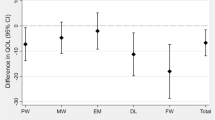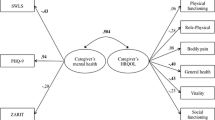Abstract
To record and compare the quality of life and attachment style of dementia and cancer caregivers. This is a comparative prospective cross sectional study. Participants were 45 caregivers of patients with cancer and 45 caregivers of patients with dementia. The study was conducted at a University Hospital and from a Day Centre of Alzheimer Disease and related disorders Association in Athens. Quality of caregivers’ life was measured by the Short Form 36 Health Survey Questionnaire (SF-36) and caregivers’ attachment was evaluated by the Experience in Close Relationships—Short Form (ECR). Caregivers’ age (cancer caregivers’ age Mean = 52.4 and SD ± 12.21, dementia caregivers’ age Mean = 58.4 and SD ± 12.8) differed significantly across diagnostic groups (p < 0.005). Dementia patients were older than cancer patients (dementia patients’ age Mean = 76.8, cancer patients’ age Mean = 65, p < 0.001). Statistically significant difference was found between two groups regarding the duration of the disease. The duration of disease in dementia patients (Mean = 3.14 years) was significantly longer (p = 0.014) than in cancer patients (Mean = 1.23 years). Subscale scores in both instruments (SF-36 and ECR), showed no statistically significant differentiation. Our data showed no statistically significant differentiation in any subscale between cancer and dementia caregivers. However, both caregiver groups noticed remarkably low levels of mental health.
Similar content being viewed by others
REFERENCES
Andreakou, Μ., Papadopoulos, Α., Panagiotakos, D., and Niakas, D., Assessment of health-related quality of life for caregivers of Alzheimer’s disease patients, Int. J. Alzheimer’s Dis., 2016, vol. 2016, pp. 1–7. https://doi.org/10.1155/2016/9213968
Argimon, J., Limon, E., Vila, E., and Cabezas, E., Health-related quality of life in carers of patients with dementia, Family. Pract., 2004, vol. 21, no. 4, pp. 454–457.
Aydogan, U., Doganer, Y., Komurcu, S., et al., Coping attitudes of cancer patients and their caregivers and quality of life of caregivers, Indian J. Palliat. Care, 2016, vol. 22, no. 2, pp. 150–156.
Braun, M., Mikulincer, M., Rydall, A., et al., Hidden morbidity in cancer: spouse caregivers, J. Clin. Oncol., 2007, vol. 25, no. 30, pp. 4829–4834.
Breitbart, W. and Jacobsen, P.B., Psychiatric symptom management in terminal care, Clin. Geriatr. Med., 1996, vol. 12, no. 2, pp. 329–347.
Brennan, K.A., Clark, C.L., and Shaver, P.R., Self-report measurement of adult attachment: an integrative overview, in Attachment Theory and Close Relationships, Simpson, J.A. and Rholes, W.S., Eds., The Guilford Press, 1998, pp. 46–76.
Brodaty, H. and Hadzi-Pavlovic, D., Psychosocial effects on carers of living with persons with dementia, Aust. N. Z. J. Psychiatry, 1990, vol. 24, no. 3, pp. 351–361.
Buck, D., Gregson, B., and Bamford, C., Psychological morbidity among informal caregivers of older people: a 2-year follow up study, Psychol. Med., 2000, vol. 30, no. 1, pp. 943–955.
Feeney, B.C. and Collins, N.L., Predictors of caregiving in adult intimate relationships: an attachment theoretical perspective, J. Pers. Soc. Psychol., 2001, vol. 80, no. 6, pp. 972–994.
Feeney, J.A. and Hohaus, L., Attachment and spousal caregiving, Pers. Relat., 2001, vol. 8, no. 1, pp. 21–39.
Gaugler, J., Nader, H., Linder, J., et al., Cancer caregiving and subjective stress: a multi-site, multi-dimensional analysis, Psycho-Oncol., 2005, vol. 14, no. 19, pp. 771–785.
Goldstein, N.E., Concato, J., and Fried, T.R., Factors associated with caregiver burden among caregivers of terminally ill patients with cancer, J. Palliat. Care, 2003, vol. 20, no. 1, pp. 38–43.
Haley, W., LaMonde, L., Han, B., et al., Family caregiving in hospice: effects on psychological and health functioning among spousal caregivers of hospice patients with lung cancer or dementia, Hospice J., 2001, vol. 14, pp. 1–18.
Harding, R., Wei, G., Jackson, D., et al., Comparative analysis of informal caregiver burden in advanced cancer, dementia, and acquired brain injury, J. Pain. Symptom. Manage., 2015, vol. 50, no. 4, pp. 445–452.
Kallergis, C., Approaching the family of a patient with cancer within the liaison psychiatry, Medical. Graphics, 2008, pp. 214–223.
Kim, Y., Carver, C.S., Deci, E.L., and Kasser, T., Adult attachment and psychological well-being in cancer caregivers: the mediational role of spouses’ motives for caregiving, Health Psychol., 2008, vol. 27, no. 2, pp. S144–S154.
Lauren, C., Vanderwerker, R.E., Laff, N.S., et al., Psychiatric disorders and mental health service use among caregivers of advanced cancer patients, J. Oncol., 2005, vol. 23, no. 28, pp. 6899–6907.
Lynda, A.A., Edwards, V.J., Pearson, W.S., et al., Adult caregivers in the United States: characteristics and differences in well-being, by caregiver age and caregiving status, Prevent. Chron. Dis., 2013, vol. 10, p. E135.
Margioti, E., Vagenas, V., Sakka, O., et al., Alzheimer patients’ caregivers survey in Greece, Alzheimer Dementia J. Alzheimers’ Assoc., 2009, pp. 7–13.
Maureas, M., Soldatos, K., and Stefanis, K., ICD-10 classification of mental and behavioral disorders, Beta, 1997, pp. 271–278.
Mikulincer, M., Gillath, O., Halevy, V., et al., Attachment theory and reactions to others’ needs: evidence that activation of the sense of attachment security promotes empathic responses, J. Pers. Soc. Psychol., 2001, vol. 81, no. 1, pp. 1205–1224.
National Statistical Service of Greece. Statistics Natural Movement of the Population of Greece, in Psychological Support in Couples with Cancer, Kayser, K. and Scott, J., Eds., Field, 2010, pp. 14–27.
Nijboer, C., Triemstra, M., Tempelaar, R., et al., Determinants of caregiving experiences and mental health of partners of cancer patients, Cancer, 1999, vol. 86, no. 4, pp. 577–588.
Oken, M.M., Creech, R.H., Tormey, D.C., et al., Toxicity and response criteria of the eastern cooperative oncology group, Am. J. Clin. Oncol., 1982, vol. 5, no. 6, pp. 649–655.
Pappa, E., Kontodimopoulos, N., and Niakas, D., Validating and norming of the Greek SF-36 health survey, Qual. Life Res., 2005, vol. 14, no. 5, pp. 1433–1438.
Pariante, C.M., Given, B., Given, C., et al., Physical functioning of elderly cancer patients prior to diagnosis and following initial treatment, Nurs. Res., 2001, vol. 50, no. 4, pp. 222–232.
Pellegrino, R., Formica, V., Portarena, I., et al., Caregiver distress in the family phases of cancer, Anticancer. Res., 2010, vol. 30, no. 11, pp. 4657–4663.
Sarris, M., Sociology of Health and Quality of Life, Athens: Papazisis, 2001.
Sadik, K. and Wilcock, G., The increasing burden of Alzheimer disease, Alzheimer Dis. Assoc. Disord., 2003, vol. 17, pp. 75–79.
Sharon, M., Clare, L., and Whitaker, C., Attachment representations in people with dementia and their caregivers: implications for well-being within the dyad, Aging Mental Health, 2012, vol. 16, pp. 845–854.
Shaver, P.R. and Mikulincer, M., Dialogue on adult attachment: diversity and integration, Attach. Hum. Dev., 2002, vol. 4, no. 1, pp. 243–257.
Tacon, A.M., Attachment and cancer: a conceptual integration, Integr. Cancer Ther., 2002, vol. 1, no. 4, pp. 371–381.
Tsilika, E., Parpa, E., Galanopoulou, N., et al., Attachment orientations of Greek cancer patients in palliative care. A validation study of the experiences in close relationships scale (ECT-M16), J. Buon., 2016, vol. 21, no. 4, pp. 1005–1012.
Tsolaki, M., Alzheimer’s disease: what happens after the diagnosis? Practical guide for patients with dementia and their families/caregivers, Mendor, 2006, pp. 113–146.
Tsolaki, M., Epidemiology of dementia, Brain, 1996, vol. 33, pp. 164–177.
Vlachogianni, A., Potamianou, Z., Panagiotou, M., Andrianaki, A., and Efthymiou, A., The life after the care, support manual former caregiver, After Life Care, 2009, pp. 4–7.
Weitzner, M., McMillan, S., and Jacobsen, P., Family caregiver quality of life: differences between curative and palliative cancer treatment settings, J. Pain. Symptom. Manage., 1999, vol. 17, no. 6, pp. 418–428.
Westmaas, J.L. and Silver, R.C., The role of attachment in responses to victims of life crises, J. Pers. Soc. Psychol., 2001, vol. 80, no. 1, pp. 425–438.
Author information
Authors and Affiliations
Corresponding author
Ethics declarations
Conflict of interest. The authors declare that they have no conflicts of interest.
Statement of compliance with standards of research involving humans as subjects. All procedures performed in studies involving human participants were in accordance with the ethical standards of the institutional and/or national research committee and with the 1964 Helsinki declaration and its later amendments or comparable ethical standards. Informed consent was obtained from all individual participants included in the study.
Rights and permissions
About this article
Cite this article
Papageorgiou, N., Zygogianni, A., Parpa, E. et al. Comparative Analysis of Quality of Life and Attachment Style among Cancer and Dementia Informal Caregivers. Adv Gerontol 12, 194–199 (2022). https://doi.org/10.1134/S2079057022020151
Received:
Revised:
Accepted:
Published:
Issue Date:
DOI: https://doi.org/10.1134/S2079057022020151




